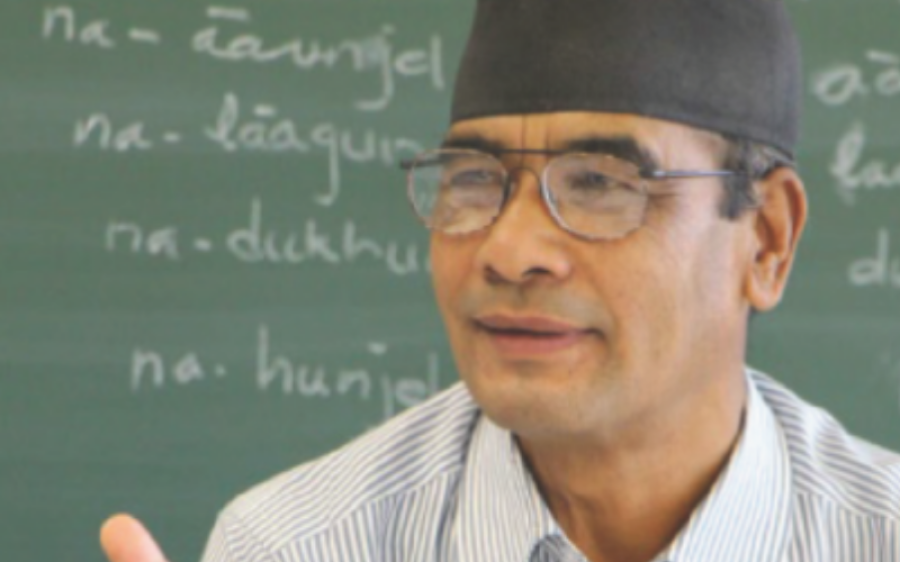As it is
Laxmi ji: Remembering a true teacher
For my lessons, he would only bring a pen and a few written notes with him. But with just his pen and his notes, he would open up a whole new universe.
Marilena Frisone
I first met Laxmi Nath Shrestha during a coffee break at the University of Heidelberg, Germany, back in 2007. I was attending a summer school in spoken Sanskrit, and he was teaching spoken Nepali at the South Asia Institute. The passion with which he was explaining new Nepali words and expressions to his students during the breaks, while sharing tea and biscuits, really struck me, which was why the following year I decided to attend the spoken Nepali course with him, where he introduced me for the first time to Nepali language and culture.
“Laxmi ji”, as that’s what all his students called him, was able to magically transform even the most difficult and unfamiliar grammatical structures into something easy to memorise, and fun to learn. His smile, his cheerful attitude, and his passion for teaching were contagious. His students loved him. He was ironic, joyous and dedicated to his job, and teaching and sharing his knowledge of Nepali culture was his life-long commitment.
I encountered him again between 2011-13 in Nepal, where I went to conduct anthropological fieldwork. We used to meet in the morning at 7.00 am at the Sugat Hotel, in Basantapur, Kathmandu, where I was staying. I wanted to learn more and he was always ready to teach. And our classrooms would always be interesting. Most times it would be the roof of the hotel, where he would sit with me for hours and teach me the Nepali language and different Nepali cultures. He used to say that he liked rooftops because they are peaceful places, and you can have a view of the city from there.
Once he even took me to a tall building in the middle of a wholesale centre, where we had to climb a shaky ladder to reach a small, quiet and isolated rooftop. That was where our lesson would take place for the day.
Sometimes he would take me down for a walk through the buzz of the crowded and loud city centre, and he would encourage me to interact with local street vendors, or shop keepers to learn new, daily-life expressions. He used to say that in order to learn about Nepali culture and language “samajmaa bichnu parcha, natra bhane hundaina!” (“you have to mix with society, otherwise it doesn’t work!”).
For the lessons themselves, he would only bring a pen and a few written notes with him. But with just his pen and his notes, he would open up a whole new universe for me.
Having studied education in the UK, Laxmiji had more than 40 years of experience in teaching. He had taught for the Peace Corps, and he had been a key figure in the Nepali education system. He convened Nepali Language Intensive Courses at the University of Heidelberg for many years, and he taught Nepali and Newa language courses at the Universities of Lisbon, Kiel, Marburg, Wien, and Zürich. I remember that often in Heidelberg, he would be so deeply immersed in teaching that he would forget to eat. In those occasions, it was his beloved wife, Belayti ji, who made sure to enter the class at lunch time and sit in the corner, discreetly reminding him (and the students too!) that “khane bela bhayo!” (“it’s time to eat!”).
His most recent course was held in 2019 at the University of Toronto, where he taught a three-week intensive course of Nepali and Newa languages. He was revered for having trained generations of Nepal Studies scholars including Declan Quigley, Siegfried Lienhard, Bernhard Kölver, Leonard van der Kuijp, Axel Michaels, Alexander von Rospatt, Christoph Emmrich, and many more.
While being such a respectable name, at the same time, he was an incredibly humble and generous person, always ready to share his knowledge with students and colleagues, and always involved in charitable work. When not in person, he would be teaching over the phone, to students and scholars working all over the world, unstoppable in his wish to make people speak the Nepali and the Newa language.
He passed away on September 3, at the age of 71. The last time I spoke to him, a few days before he passed, he said: “Kuraa gardaa gardai jhan kuraa garna manlagcha, sikaaune kura dherai baki chha! Baffi baaf! Tara, aja ko laagi aaram garnus, ani bholi bhetaun laa!” (“The more we talk the more I feel like talking, there is a lot left to teach. Ah! But for today take some rest, and we’ll meet tomorrow). Even in this very last conversation, his concern was for the large number of topics he still wanted to teach. It is with this sentence that I think it would be best to conclude a portrait of the truly passionate and dedicated teacher that Laxmi Nath Shrestha was. And that is how I will always remember him.




 9.89°C Kathmandu
9.89°C Kathmandu










